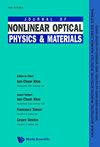材料科学的深度学习建模策略:从天然材料到超材料
IF 2.3
4区 物理与天体物理
Q2 OPTICS
引用次数: 6
摘要
在材料相关研究中,计算建模是发现具有优异性能的新材料的重要方法。然而,材料的高设计灵活性,特别是在超材料领域,其中亚波长结构在设计中提供了额外的自由度,在各种实际应用中带来了巨大的计算成本。随着大数据的出现,深度学习(DL)为许多传统的机器学习和模式识别任务(如图像分类)带来了革命性的突破。伴随而来的数据驱动建模范式也为材料科学提供了变革性的方法论转变,从常规的试错到智能材料发现和分析。本文从天然材料和超材料模型选择的角度,系统地综述了深度学习在材料科学中的应用。该综述旨在揭示数据模型关系背后的逻辑,重点是材料研究中不同场景的合适数据结构和相应的解决问题的DL模型体系结构。本文章由计算机程序翻译,如有差异,请以英文原文为准。
Deep learning modeling strategy for material science: from natural materials to metamaterials
Computational modeling is a crucial approach in material-related research for discovering new materials with superior properties. However, the high design flexibility in materials, especially in the realm of metamaterials where the sub-wavelength structure provides an additional degree of freedom in design, poses a formidable computational cost in various real-world applications. With the advent of big data, deep learning (DL) brings revolutionary breakthroughs in many conventional machine learning and pattern recognition tasks such as image classification. The accompanied data-driven modeling paradigm also provides transformative methodology shift in materials science, from trial-and-error routine to intelligent material discovery and analysis. This review systematically summarize the application of DL in material science, based on a model selection perspective for both natural materials and metamaterials. The review aims to uncover the logic behind data-model relation with emphasis on suitable data structures for different scenarios in the material study and the corresponding problem-solving DL model architectures.
求助全文
通过发布文献求助,成功后即可免费获取论文全文。
去求助
来源期刊
CiteScore
3.00
自引率
48.10%
发文量
53
审稿时长
3 months
期刊介绍:
This journal is devoted to the rapidly advancing research and development in the field of nonlinear interactions of light with matter. Topics of interest include, but are not limited to, nonlinear optical materials, metamaterials and plasmonics, nano-photonic structures, stimulated scatterings, harmonic generations, wave mixing, real time holography, guided waves and solitons, bistabilities, instabilities and nonlinear dynamics, and their applications in laser and coherent lightwave amplification, guiding, switching, modulation, communication and information processing. Original papers, comprehensive reviews and rapid communications reporting original theories and observations are sought for in these and related areas. This journal will also publish proceedings of important international meetings and workshops. It is intended for graduate students, scientists and researchers in academic, industrial and government research institutions.

 求助内容:
求助内容: 应助结果提醒方式:
应助结果提醒方式:


